why do you scuba dive in darkwater rivers for megalodon teeth?
Aren't there easier places to find megalodon teeth?
Why don't you look for shark teeth in creeks or on the beach?
I choose to look for megalodon teeth in darkwater rivers for a variety of reasons outlined below, and despite answering the question
"Is Darkwater Diving Dangerous"I wrote this article for people wondering why I still dive in darkwater rivers to find some of the megalodon teeth for sale I have in my online store and in my personal collection.
A question I get fairly often is "Why do you scuba dive for megalodon teeth in rivers?" to which I respond "because I enjoy finding megalodon teeth".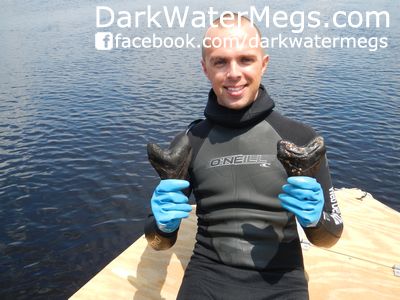
Many people wonder why I bother diving in the sometimes cold, always dark, and often dangerous rivers in the Southeast United States searching for megalodon teeth. I will assume if you have made it this far you understand the allure and value of megalodon teeth and are wondering why I don't just pick up fossilized shark teeth along the beaches or in shallow creeks I can wade in.
There are several reasons I choose to brave the dark waters of the rivers in search of megalodon teeth but the most important reason is there are more large megalodon teeth in dark water rivers than almost any other place people can access.
People have been finding fossilized shark teeth on beaches for many years, and I started shark tooth hunting on a beach not far from my home, the problem with finding teeth on the beach is the larger teeth are often too heavy and dense to be found on top of the sand and are buried deep under the surface making them inaccessible. Sometimes during a storm, beach renourishment dredging, or just getting luck you can find a megalodon on the beach but it is a rare and special occasion.
Heavy teeth and light sand mean that most of the teeth in the area are far under the surface, combine that with the fact that most beaches are visited daily by quite a few people and your odds of finding a large megalodon or other fossilized shark tooth becomes slim.
Some people hunt small streams and creeks hoping to find megalodon teeth, and while this can be significantly more productive than some beaches there are other drawbacks. First in many places in the Southeast US it is illegal to dig in or around creeks as to not disturb the waterway, that means that the teeth you find will be laying on top. Other areas it is illegal to hunt in creeks or streams without special permission and a license or permit. Also much like beaches these shallow creeks are accessible to a larger portion of the population so the changes of someone else hunting the creek before you is relevant.
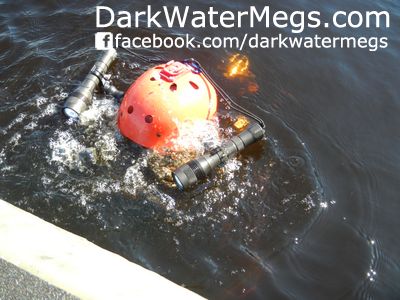
Megalodon teeth along with other fossilized shark teeth can be found inland hunting also. Construction sites, mining operations, and other sites where the top layers of soil have been removed are all possible locations for fossilized teeth to be found if the site is in a low elevation area in the Southeast US that has fossil deposits. The problem with searching for fossils in these areas is that in almost all cases it is now highly illegal. Both mines and construction sites used to be frequented by fossil hunters hoping to find megalodon teeth and other fossilized pieces of the past; unfortunately, as our society entered an era of more and more lawsuits the construction and mining companies closed their grounds to fossil hunters due to the fear of lawsuits. This new liability sealed the fate of many fossils, now destined to be broken by heavy mining equipment or buried under topsoil and sod in a subdivision.
Ocean fossil hunting is a popular option among fossil hunters who are experienced scuba divers, the visibility is almost always 10-100x better than in dark water rivers, there is very little current to contend with, and many of the hazards of river diving do not exist in the open ocean. However, ocean diving for megalodon teeth is not without it's perils. While megalodon teeth can be found in the ocean throughout the Southeast US most of them reside in deeper water found offshore in ledge systems where the fossilized shark teeth have been eroding out of elevated sections of the ocean bottom. Many of these ledge systems are located many miles offshore in deep open ocean, diving to depths exceeding 100' carries many risks and multiple divers have lost their lives in that pursuit in the last few years. For the most part the megalodon and other fossilized shark teeth found in the deep open ocean have been exposed by ocean currents and tides for an extended period of time and often are very worn and in poor condition due to the ocean sands and other hard objects being washed over the teeth over and over.
So why do I scuba dive in dark water rivers for megalodon shark teeth?
Well I enjoy scuba diving, as a lifelong swimmer I am very comfortable in the water and prefer water hunting to beachcombing or walking creeks or land sites. If done correctly, with the right licenses, permits, and permission river diving is also one of the more ethical ways to collect shark teeth. Some people still risk trespassing on mine sites, illegally digging in 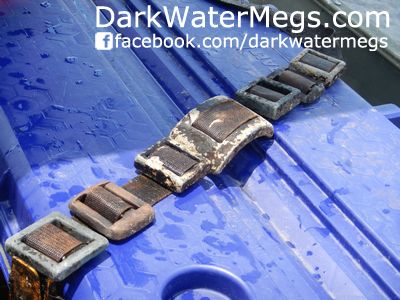 creek beds, I do not believe in taking those avenues and while dark water scuba diving is more physically dangerous I prefer it. One of the main reasons I choose to dark water dive for megalodon shark teeth is that I am able to look for teeth in places that very few, or in some cases no other person has ever been. Now there are many rivers in the Southeast that are popular among shark tooth hunters, I have found many weight belts, dive knifes, and other pieces of equipment lost or dropped by other divers before me; that being said there are some occasions where I have dove some very remote places where I believe there is a chance I am the first person to scuba dive along the bottom of that section of river.
creek beds, I do not believe in taking those avenues and while dark water scuba diving is more physically dangerous I prefer it. One of the main reasons I choose to dark water dive for megalodon shark teeth is that I am able to look for teeth in places that very few, or in some cases no other person has ever been. Now there are many rivers in the Southeast that are popular among shark tooth hunters, I have found many weight belts, dive knifes, and other pieces of equipment lost or dropped by other divers before me; that being said there are some occasions where I have dove some very remote places where I believe there is a chance I am the first person to scuba dive along the bottom of that section of river.
Dark water diving for megalodon teeth is dangerous (see article "Is Darkwater Diving For Megalodon Teeth Dangrous?") but with extensive experience, training, and understanding of the environment I choose to look for the majority of my megalodon teeth in dark water rivers. Many of the dives I do I come up with nothing but the experience and the adventure, large megalodon teeth in good condition are rare finds anywhere and it often takes many dives or many days to find a really good one.
I hope this article has helped explain why I personally dive for shark teeth in dark water rivers, if you are a fellow shark tooth hunter I hope you found the information accurate to your experience, if you are not a shark tooth hunter I hope you found the article informative and if you would like a fossilized megalodon shark tooth you can find some for sale at my online store, along with other fossils for sale.
Megalodon Shark Teeth For Sale
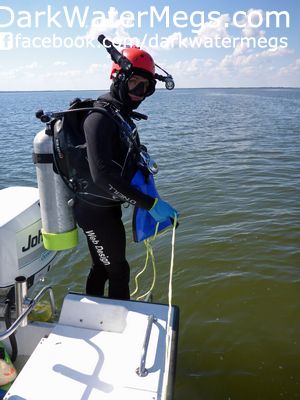
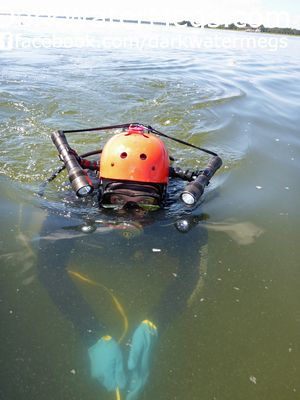
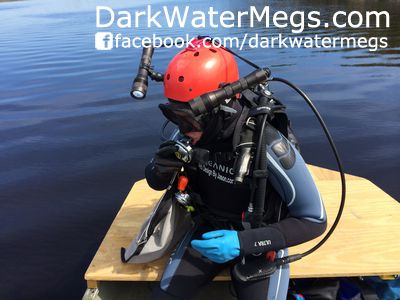



 creek beds, I do not believe in taking those avenues and while dark water scuba diving is more physically dangerous I prefer it. One of the main reasons I choose to dark water dive for megalodon shark teeth is that I am able to look for teeth in places that very few, or in some cases no other person has ever been. Now there are many rivers in the Southeast that are popular among shark tooth hunters, I have found many weight belts, dive knifes, and other pieces of equipment lost or dropped by other divers before me; that being said there are some occasions where I have dove some very remote places where I believe there is a chance I am the first person to scuba dive along the bottom of that section of river.
creek beds, I do not believe in taking those avenues and while dark water scuba diving is more physically dangerous I prefer it. One of the main reasons I choose to dark water dive for megalodon shark teeth is that I am able to look for teeth in places that very few, or in some cases no other person has ever been. Now there are many rivers in the Southeast that are popular among shark tooth hunters, I have found many weight belts, dive knifes, and other pieces of equipment lost or dropped by other divers before me; that being said there are some occasions where I have dove some very remote places where I believe there is a chance I am the first person to scuba dive along the bottom of that section of river.

